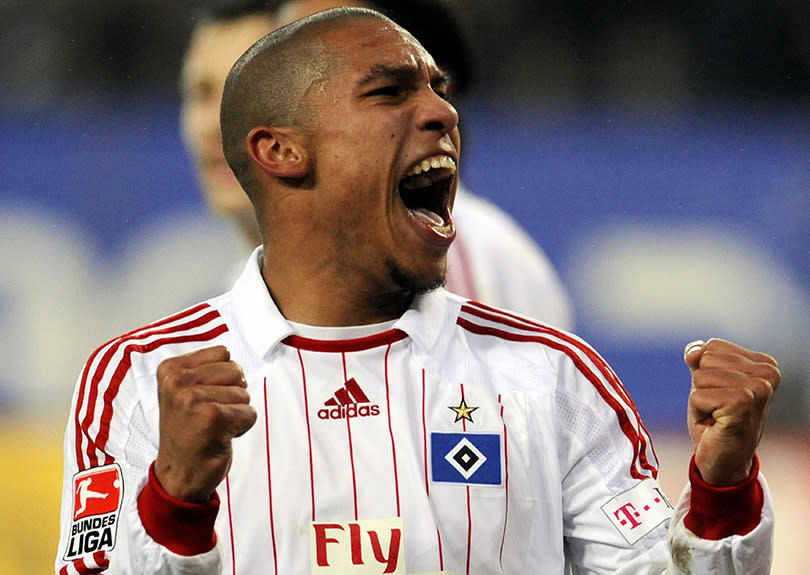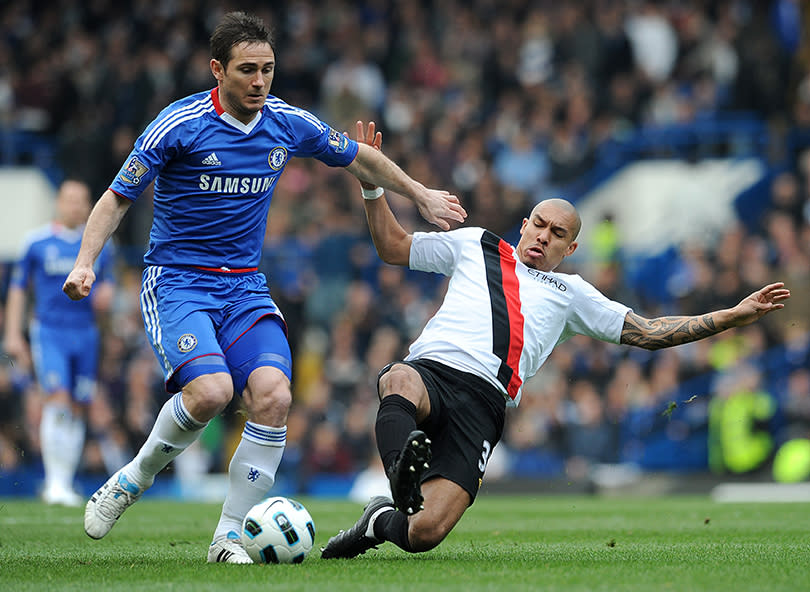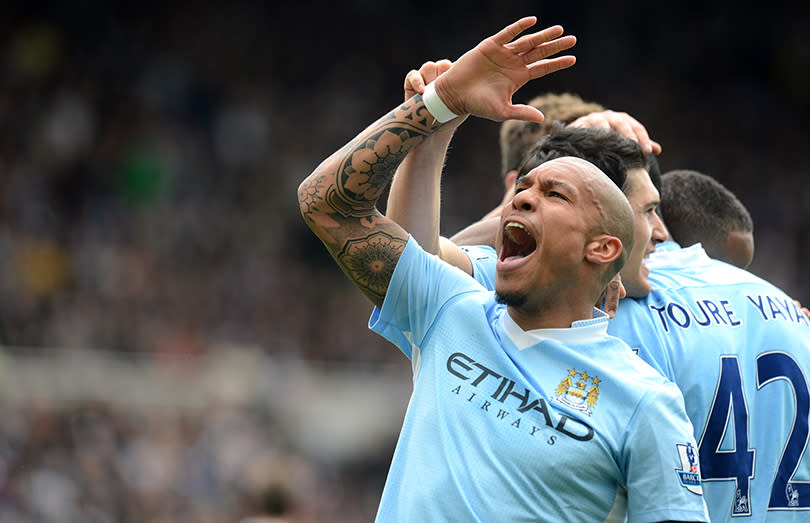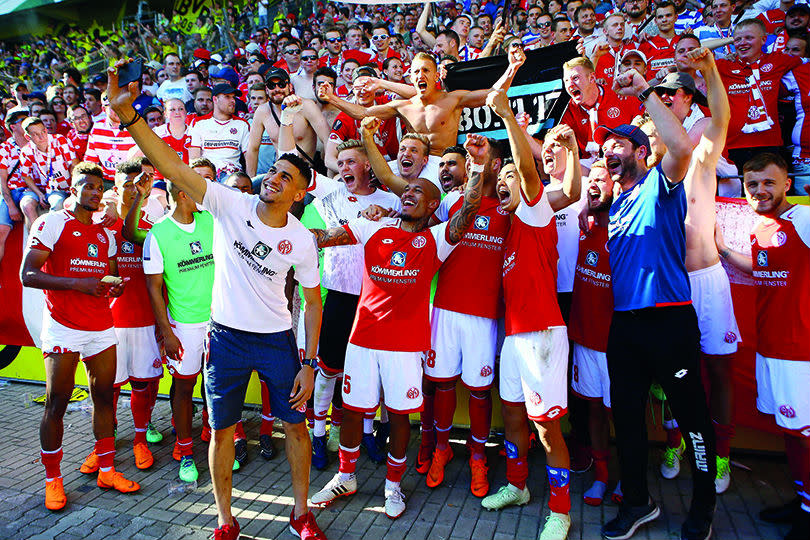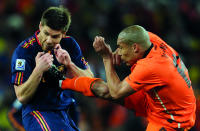The big interview: Nigel de Jong – I liked being the underdog at Man City. People only knew United, but we wanted to change that
There aren’t many footballers called Nigel, let alone Dutch ones – where did the name come from?
Nigel Robinson, via Facebook
It was actually my mum’s choice. There was a well-known violinist called Nigel Kennedy back in the day, and the racing driver Nigel Mansell was pretty famous when I was born, so she decided to call me that. It’s an English name, so maybe that was prophetic.
Your father, Jerry, won three caps for the Netherlands – can you remember watching him play?
Tony Barnes, London
As a little kid I’d dreamed of becoming a footballer, and that was my dad’s job so I loved watching him play. My mum and dad separated when I was young, but I watched a lot of him on TV when I could. Watching him gave me an urge to play in front of 50,000 fans one day. His criticism about my game was always very constructive. It was my mum who was a bit harsher on me!
Was it a tough childhood growing up in west Amsterdam?
Andy van Ruijn, Utrecht
It was, but I was fortunate that I had a mother who pushed me to do well at school. I would always be outside with my boys playing football. You have to remember, this was pre-social media, so there wasn’t a great deal to do but kick your ball and try to improve your skills in the streets. We would hop from neighbourhood to neighbourhood and just chill with the other boys. I did have other friends who tried to make money in different ways, but luckily I steered away from that – my mum was strict.
Which players did you love watching when you were growing up?
Sebastian Price, Surrey
I loved Fernando Redondo. He’s one of my favourite players of all time. Romario is another favourite because he played with my dad at PSV. I got to watch him at training and also inside the dressing room. I saw him as a player but also as a personality and that rubbed off on me. I loved how he created chances out of absolutely nothing. Patrick Vieira, who is now a good friend of mine, was also a role model, and I was a massive fan of Roy Keane, too.
I loved Keane’s heart, he was fearless. Even though he wasn’t a big guy like Duncan Ferguson, he was the man. I used to watch the Premier League when I was a kid and he always had that look in his eyes that told you he meant business. It was like he was saying: ‘It isn’t happening today mate, this is my territory’. People forget that he was a great footballer – he scored banging goals, was a box-to-box player and good passer. If I’d played against him, he would have come out on top!
I once read that you have a degree in economics. Is that true?
Doug Cooper, Dundee
Yes, I graduated in 2001 in Amsterdam. It was really important for me to learn about finance. You see a lot of athletes now who simply don’t understand their own money. It should be impossible for a top-level professional to go broke, but I’ve seen it happen on many occasions. I wanted to earn my degree to protect myself financially, so that I knew how to invest sensibly and keep earning a living after football. You need people around you with good financial knowledge, but you need to have a base of knowledge yourself, too. You can have £10m in the bank, but if you don’t understand where it goes and how you’re spending it, you could end up broke.
As a youngster, I had the pleasure of seeing you and Mark van Bommel run the midfield in the same Dutch team. Do you think the midfield destroyer is now becoming extinct?
Edward Machin, via Facebook
They’re definitely dying out. I think it’s because football is becoming more and more controlled. At every match we’ve got around 300 cameras, a referee and a video assistant referee. To be a tough guy, sometimes you have to do things that people don’t see, and you can’t get away with that sort of thing now. There’s a bigger emphasis on technical football and offensive players, so there are fewer hardman midfielders.
It’s a pity because I loved those battles between Arsenal and Manchester United back in the day, plus Atletico Madrid against Real Madrid. You just don’t see those battles between Diego Simeone and Redondo or Keane and Vieira now. I wish I could’ve played in them. It was more exciting for me to watch those duels than [Dwight] Yorke and [Andy] Cole scoring loads of goals, but it’s dying out now.
Your nickname is ‘The Lawnmower’ – where did it come from and do you do your own mowing?
Ryan Walsh, Warrington
It started off when I was at Manchester City. I’d end up all over the pitch, always making challenges and covering every blade of grass, so the fans were calling me that. I loved it though; the City fans are some of the best I’ve ever played for. I’ve mowed my garden a few times in the past. Most of the time I’ll just let someone else do it, but if it’s really long and desperately needs it, I’ll get the mower out and do it myself.
You played in a team with Rafael van der Vaart, Wesley Sneijder and Zlatan Ibrahimovic at Ajax – that must have been a special time?
Arnold Wischum, Amsterdam
It was an incredible time. There was the perfect balance of talent and experience in that line-up, and Ajax were still really competitive in the Champions League at that time – we would always qualify and often reached the knockout stages. That attracted lots of young talent from different countries, which then created the group we had. About 80 per cent of the team I played with went on to play for top European clubs.
What was it like training with Zlatan every day at Ajax? Was he really full of himself?
Danni Cook, via Twitter
He’s an amazing guy. He loves to joke around. He isn’t cocky or arrogant – he’s confident, he loves himself. I was really good friends with him at Ajax. I’d go to his house for some dinner and so on. He’s a really good dude and he’s still the same person. I haven’t seen him for a little while, but it’s been great to see him go on to have a long, successful career.
You were once labelled a ‘right-footed Edgar Davids’ by a Dutch journalist. Did you see similarities between the two of you?
Johan der Vij, via Facebook
Davids was one of my idols, but he was more of a box-to-box player. I can see the similarities in terms of our general mentality, position and the fact that we were both schooled at Ajax, but he was more attacking and technical compared to me. I don’t want to discredit him; he was more than a defensive midfielder. He could score goals and create plenty of chances as well.
NEXT: Mark Hughes vs Bobby ManciniDid you have any other options when Man City bought you from Hamburg in 2009? How did you find playing for Mark Hughes?
Ryan Rhodes, via Facebook
I’m so grateful for the opportunity that Mark Hughes gave me. I had a brilliant relationship with him and still do to this day. He had a very strong character and he was a winner, and that reflected in the type of training sessions he put on. They were always very intense and competitive.
I signed for City when they were around 11th or 12th in the Premier League and I had offers to go to other big teams, but they painted a great picture for me. They told me I’d be the first of many major signings and I just needed to be patient. They said if I stayed at the club long enough, I’d see the results. I believed them, and it was an opportunity to play in the league I’d watched since I was a kid. I liked being the underdog. People only knew about Manchester United but now we wanted to change that.
What do you think of Manchester as a city? Did you enjoy living there?
Mark Waugh, Didsbury
It rains for about 11 months a year in Manchester, so I’d say it’s never going to be one of my top holiday destinations. But apart from that, the atmosphere in Manchester was always great. I enjoyed some of the best times of my career in the city. It’s not quite as big as London but there’s still so much to do. The city was usually buzzing during the summer and I loved going to a pub to have a Sunday roast. I’d rate Manchester highly, but I won’t live there after my career because of the bad weather!
How big a cultural shift was it when Roberto Mancini replaced Hughes as Man City manager?
Ralph Williams, via Twitter
Well, Mancini is Italian, so it came as no surprise that he was tactically excellent. He had a different mindset to Hughes; he placed lots of emphasis on defensive positioning. First of all, he wanted you to be defensively stable and then think about the second step. As a team and individuals we underwent a pretty big transition under him. Both Mancini and Hughes turned the club around. We won nearly every trophy under Mancini, so it was an incredible time and he deserves a huge amount of credit.
Did you really believe City could turn things around on the final day against QPR and win the title?
Jimmy Truman, via Facebook
We were 1-0 up, playing a side battling against relegation, and then out of nowhere they came from behind and were winning 2-1. At that point, we all started to look at each other and think: ‘It’s not going to happen, is it?’ You have this negative thought process initially, but we refused to give up and Mancini then made some offensive changes by bringing Edin Dzeko and Mario Balotelli on, so we had three strikers on the pitch.
Thank God it all worked out. The way it ended was just crazy, and it’s something you’ll never see again. That moment as Sergio Aguero scored, in terms of happiness and relief, was easily the best moment of my career. It’s what football is all about: passion, emotion, winning. I can remember sprinting towards the corner flag where Sergio was celebrating with his shirt off. There were grown men in the stands in tears! Everyone was bamboozled by what had just happened. I’m so happy that I was part of it.
People always go on about how tough you are – do you think your technical ability is underrated?
Roger Brucht, via Facebook
Yeah, but that’s pretty normal if you’re a defensive midfielder. I love playing in that position because I understand the impact I can have on the team. People never talk about Roy Keane’s technical ability; they just talk about his physical attributes.
People forget, to play in my position you’ve got to have technical ability to guide the team. You’re in front of the defence and also have to feed the attacking third, so you’re in the middle; you’re key. My passing rate at every club has always been good because I love to play football – I was taught to play with proper technique at Ajax.
Stuart Holden and Hatem Ben Arfa both suffered serious injuries from your tackles – did you mean to hurt either of them?
Johnny Powell, Devon
No, I’ve never deliberately hurt anyone. I’ll always go in hard when it’s a 50-50 ball but I don’t want to hurt anybody – they were just unlucky challenges and unfortunately they had to sit out a part of their career to do their rehab, which I don’t feel good about. But football is a contact sport and sometimes you will get injured or injure someone. I would always go into a 50-50 harder than the other player because I didn’t want to get injured myself. I spoke to both guys after. I left it a bit of time and then got in touch with them, and we had a chat about it. Everything’s cool now, it’s done.
You’ve faced so many great players and sides in your career, but just how tough was it stopping Spain’s passing style during the 2010 World Cup Final?
Howard Wright, via Facebook
Really tough, as even though I could see their passing momentum building, they still played with a speed and confidence that I couldn’t stop. I like to pick-pocket balls off opponents and I wasn’t able to do it. We decided to stay compact, try to not let them play out from the back, and we felt we’d have a good chance to win on the counterattack because of their high line. Arjen Robben had a big opportunity to score in the second half from that exact game plan but couldn’t quite finish it off. They had an incredible team, though: Xavi, Xabi Alonso, Andres Iniesta and so many other players who were all in their prime.
How disappointing was it to concede so late when you’d done so well to stay in it?
James Parker, via Twitter
It was devastating. I had come off after around 100 minutes because we were already preparing for penalties. But then Iniesta scored after 116 minutes and we barely had any time to respond. We all had to walk past that trophy, back into the dressing room, and see the massive disappointment on each other’s faces.
It was disappointing because that’s the biggest stage for any footballer and the chance to win that prize comes once in a lifetime, maybe twice if you’re lucky. It was really disappointing but we could be extremely proud of what we achieved as a team in 2010.
NEXT: And what about that tackle? Does it frustrate you that people still talk about your tackle on Xabi Alonso in the final, rather than your individual performance?
Tom Dicks, Liverpool
No, it’s not that frustrating. You have to understand – that was something that happened on the world stage, an action that everyone saw around the globe. It doesn’t annoy me at all. I’m over it, and that’s football. I was lucky I was able to play the rest of the game. I just wanted to play the ball – that was my only focus.
I didn’t see Alonso coming because he was on my blind side. I didn’t expect to get sent off at the time because I felt it was obviously an unfortunate incident. I was lucky that an English referee was in charge, Howard Webb, because he’d seen many hard challenges in the past. I thought he would give me the benefit of the doubt because I put my hands up immediately after it.
Did you speak to Xabi Alonso after the final and have you discussed it since? Is it water under the bridge?
Raquel Barrett, Liverpool
We’ve seen each other but we’ve never spoken about that moment. It’s just a moment in football history. At the end of the day, he won a World Cup. It’s not something that will follow him in a negative way. We play a contact sport and sometimes you will get a red card for a lesser challenge. That incident came on the world stage so it gained a lot of attention. Maybe one day we will see each other, have a beer and laugh about it. Ultimately, he won the game and I didn’t. I think he had the last laugh.
THE OTHER SIDE Alonso: It felt like my body had been torn apart after De Jong's ‘tackle’
What has gone wrong with the Dutch team in the past few years?
Bryan Rudy, via Facebook
I believe the older generation of players were cut off too soon. Players from my generation weren’t really considered for selection after the 2014 World Cup and I think our experience could have helped the younger players. The transition was too fast. You can’t have a side consisting solely of youngsters with no experience. Every country goes through a phase of rebuilding – the same thing happened with Belgium and France. They missed some big tournaments and then came back a lot stronger. We will do the same.
Pep Guardiola angrily confronted you after your tackle on Joshua Kimmich against Bayern Munich in 2015. What did he say to you?
Josh Jenkins, via Facebook
He was just sticking up for his player, it was pure emotion. As a coach he is very emotionally attached to all his players. Pep had the right to express the way he felt and so did I. We’re men, not kids. We’ve both got egos and we wanted to defend ourselves. If he wants to say something to me, then that’s cool. It was just a little scuffle, really.
We miss you here in LA! How did you find your season with the Galaxy in 2016? And how far behind is MLS compared to the rest of the world?
‘LAG Explicit Rumors’, via Twitter
There’s no relegation system so there’s no real pressure, and because of that there’s no genuine sense of winning and losing. You might lose, but there’s always a next time and you know that you’ll always have next season to try to make amends, with no repercussions. That’s why the level stays the same each year. Soccer isn’t one of the biggest sports in America so there isn’t the same youth development as in Europe.
Bringing in more foreign players doesn’t help. The country needs to focus on youth development and make more children aware of soccer. I really enjoyed my time with the Galaxy, though – my manager Bruce Arena was amazing. We had a great team – me Stevie G, Robbie Keane, Giovani dos Santos and Ashley Cole. I was only there for nine months because I missed the competitiveness of European football, but I’m still happy I made the move.
Is it true you opened a car dealership while you were in Hamburg? Ever sold a motor to anyone famous?
Craig Gray, via Twitter
I love cars because my grandfather was a general manager for Ford in Holland and always had a brand new car every six months, which caught my attention. I always planned to do it providing I had the necessary funds. When I moved to Germany, one of the best places to live when it comes to cars, I decided to start up the business there. I met my partner around that time too, and 11 years later both the business and the relationship are still going strong. It’s really popular with footballers. Loads of players, like Wesley Sneijder, Robin van Persie and Kevin-Prince Boateng have bought cars from me over the years.
Are you planning to play on for much longer? Will you ever return to Ajax?
William Edstrom, via Twitter
I’m happy in Mainz at the moment, but I’m nearly 34 now. I see myself playing for maybe one or two more years and then I’ll call it quits. After that, I’ll just play with my friends for fun, drink a few beers and enjoy the rest of my days as a retired footballer.
This feature originally appeared in the July 2018 issue of FourFourTwo. Subscribe!

 Yahoo Sport
Yahoo Sport 








































